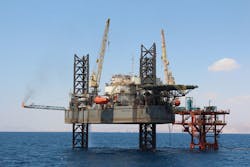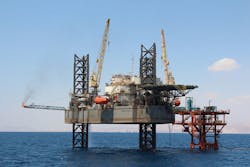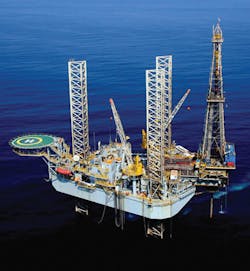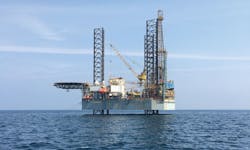Egyptian drilling contractor builds shallow-water jackup fleet
Jeremy Beckman
Editor, Europe
Drilling contractors continue to downsize in most parts of the world except the Middle East, where offshore activity has held steady. One of the more opportunistic players in the region is ADES International Holding which has taken advantage of continued overcapacity in the market to acquire and recondition legacy jackups from the 1970s and ’80s for drilling and well maintenance in benign environments, primarily offshore Egypt.
Following its recent listing on the London Stock Exchange and a successful campaign to raise $170 million via a share issue, the company is now looking to compete for work more widely in the Middle East North Africa (MENA) area and elsewhere, and to potentially acquire deeper-water rigs to meet growing demand in the Eastern Mediterranean.
ADES, which stands for Advanced Energy Systems, is registered in Dubai but based in Cairo, and three-quarters of its roughly 1,200-strong workforce are Egyptian. Executive Chairman Ayman Abbas who formed the group in 1998 is one of the main shareholders, and provided most of the company’s initial capital. According to CEO Dr. Mohamed Farouk, the main impetus at the time had been a pressing need for onshore rigs in Egypt. Over the next decade, demand also grew for offshore rigs to service shallow-water wells in the Gulf of Suez, some operated by indigenous contractors with limited funds.
In 2004, the company responded by acquiring a 1982-built jackup barge (Admarine II) from Nico World, which initially provided accommodation for offshore drill crews and was subsequently upgraded to perform rig-less workover operations for numerous consortia, including the Eni IOEC/EGPC joint venture Petrobel. “There was no intention at that point to be a fully-fledged offshore driller,” Farouk said, as ADES had already established itself as the number three drilling contractor in Egypt, behind Global Santa Fe and the Maersk Drilling/EGPC venture EDC. From 2012 onwards, however, the company decided to change tack, and over the next four years acquired nine legacy jackups constructed between 1974 and 1981 from Transocean, Paragon Offshore, Diamond Offshore, Hercules Offshore, KCA Deutag and TODCO. In the latter case, the jackup has since been converted to a mobile offshore production unit (MOPU).
All the rigs have been rebranded, along with the barge and MOPU, with the ‘Admarine’ designation. Eight are currently dedicated to the Egyptian offshore sector, working for GPC, GUPCO, Petrobel and Petroenzima. The other three jackups,Admarine 261, Admarine 262and Admarine 266, are all on contract to Saudi Aramco offshore Saudi Arabia.
Life extension procedures
With an average age of over 35 years, the fleet is not the youngest but as Farouk pointed out, “50% or more of the jackups operating at present are in that age range, and those we have acquired were all well maintained by their previous owners. On taking delivery of our rigs, we refurbish them, where necessary replacing or adding steelwork to extend their service lives and render them fit for purpose for benign environment, shallow-water areas such as the Gulf of Suez and offshore the Arabian Peninsula. The rigs we operate are not suited to areas prone to wet, humid conditions such as South Asia or West Africa, where there is also an ocean swell effect.”
Last year, Farouk added, ADES acquired five of the 22 jackups sold worldwide, and the company is on the lookout for further purchases. “Some would-be sellers are under financial distress,” he explained, “or they want to focus more on deeper or ultra-deep wells, or get out of offshore altogether. We are continually evaluating opportunities. One reason we want to raise equity is to make more asset acquisitions in order to keep our business growing.”
Being known in the market gives ADES access to companies that want to sell assets, Farouk added. “We operate a standard scouting procedure: first, we send third parties such as DNV or Lloyd’s Register to assess the condition of the rig, and after that initial screening, we ourselves will inspect it to determine its value. If we then decide to buy, we will take the asset for reconditioning to a nearby shipyard, or if this is not available, to a sheltered water location in the Gulf of Suez. There we study the scope of work required in terms of structural steelwork, marine systems and upgrades to drilling and safety equipment, in order to achieve a certificate of compliance and for the rig to renew its special periodic survey. This process can take two to six months to complete.”
The company has been able to build a strong project team for getting legacy rigs back into operation, Farouk says. “Our first project, in 2004, was the overhaul of the jackup barge which needed to be completely refurbished. To make it self-propelled, we had to construct the propulsion system to allow the barge to transfer easily between wells without the need for tow boats or any other mode of move assistance, and we also replaced the legs. There was no shipyard in Egypt suited to such programs for offshore jackups, so we decided to build this capability internally, bringing in specialists from UAE fabricator Lamprell to support the project. This was a major undertaking involving substantial capex investments.”
One recent example of the project team’s capabilities was theAD 266: Aramco requested various modifications so that the rig could continue its contract after ADES had acquired it last November. These included:
- Accommodation upgrades, with the personnel on board (POB) capacity increased to 100, and the addition of other facilities
- Zero Pollution system, which entailed adding a new oil/water separator and skimmer tank and sealing the unit to prevent any risk of oil pollution
- Relocation of cement unit from the machinery space to the main deck
- SIMOPS: engineering, design and execution to cover the Aramco platform with a FiFi deluge system with water supplied from the rig
- Mud pits: dividing the sludge pit with all the associated piping work
- Well test piping modification.
Aramco subsequently acknowledged that all its requirements had been fulfilled, and the rig is currently back in service offshore.
“All structural changes on our rigs are DNV or ABS-compliant, and ABS has classed most of our assets,” Farouk said. “With DNV we are always looking to extend the lives of our assets, conducting structural studies to ensure that we have appropriate risk prevention maintenance systems in place.” Farouk also notes that ADES has a technology alliance with Texas-based Ventek, a specialist in novel technology solutions for offshore platforms. This company provided engineering services for the MOPU conversion in the form of structural analyses and designs, naval architecture studies, updates to the piping system, and electrics modification studies. WorleyParsons was the engineering consultant for the entire project.
“Today our offshore rigs are engaged mainly in workovers and well maintenance,” Farouk adds, “although some are performing exploration drilling in the Gulf of Suez, while our MOPUAdmarine I- the first to operate in Egyptian waters - is currently producing 5,000 b/d for South Abu Zenima Petroleum (Petroenzima) on the Mushil field. Some of our clients do not have the capex to put in fully fledged pipeline facilities: they want production quickly, and MOPUs are one solution that we see as a potential growth market, even though they are not popular at present in the wider Middle East region.”
Lower-cost model
This summer, ADES secured new contracts for two of its rigs in the Gulf of Suez. Petrobel contracted the jackupADMARINE 88for a three-month drilling campaign, with extension options, and extended the contract of the jackup ADMARINE Vby six months, also with options. In addition, ADES entered a farm-in agreement with Fanar Petroleum related to the jackup ADMARINE VIII, which recently conducted a frac program for Petroenzima on a well in the North July concession.
ADES claims its operating model allows its rigs to perform with lower opex than its competitors while sustaining profitability, even in the current era of depressed oil prices. This is due in part to the company’s large, low-cost but skilled Egyptian workforce supported by the technical capabilities of the in-house refurbishment and maintenance team, “and also our understanding of the market,” Farouk claimed. For bigger clients such as Aramco, BP and Eni, he added, making minor cost savings through adjustments to operating procedures for individual jobs is less important than achieving and sustaining cheaper production from their offshore wells, in order to ensure a breakeven price for the oil. “We are always trying to challenge the drilling plan set by the client, seeking opportunities to achieve improvements to the targeted schedule.”
ADES uses international training centers for its drilling crews, and is building its own academy in Cairo which will train personnel from graduate level upwards. In Saudi Arabia, the company already operates with 60% Saudization, in compliance with In-Kingdom requirements, “but we would like to use locals more, build our knowledge locally further,” Farouk said.
One aim of the recent share issue was to help secure funds for ventures into new markets in the region, including the Gulf Cooperation Council countries of the UAE and Bahrain, and onshore Iraq. Outside Egypt, Saudi Arabia and Algeria, where the main client is Sonatrach, the company is currently pre-qualified to operate in the Saudi-Kuwaiti Neutral Zone, India and Mexico. Each country in the MENA region operates its own procedures for pre-qualifying drilling/intervention contractors, according to Farouk. “Generally, we will be asked for our track record, the number of years we have been working - some NOCs want to scrutinize in more detail our assets and the management system that we operate. To work for Aramco, you have to demonstrate that you have been profitable for over 10 years, with no prospect of struggling as a distressed company two years in the future.”
The UAE hosts some of the world’s major offshore fields, all of which are undergoing continued development to raise or streamline production. This can be a difficult market for foreign drilling contractors to penetrate, Farouk admitted, “but Abu Dhabi’s National Drilling Company is on the lookout for competent subcontractors to work on some of its assets.” Prior to the recent sanctions imposed by the Gulf Region countries, ADES had also been evaluating opportunities in Qatar, holding discussions with Doha-based Gulf Drilling International. Farther afield, Mexico continues to open its shallow-water acreage to foreign E&P consortia, and ADES is monitoring developments. “There is no need for us to establish an operation in Mexico at present,” Farouk said, “the main priority being to be able to mobilize a suitable rig to the sector when required.” And there are no special technical issues impacting jackups operating in any of the targeted regions, he added, although ADES is looking to boost prospects for work by converting most of its rigs to be ‘zero discharge.’
“Most of the wells we drill are in shallow water and at relatively shallow surface depths,” Farouk said, “but we are looking to branch into drilling high-pressure gas wells. We are also considering forming an ultra-deepwater drilling joint venture to take advantage of emerging opportunities in the eastern Mediterranean from the Egyptian sector northwards - this would probably be in partnership with one of the major players that owns deepwater rigs. Due to continued overcapacity some of these assets are idle - entering a joint venture would allow us to get hold of some of these assets and their management in order to expand our capabilities, offering an innovative, lower-risk approach to the deepwater opportunities in the region.”



